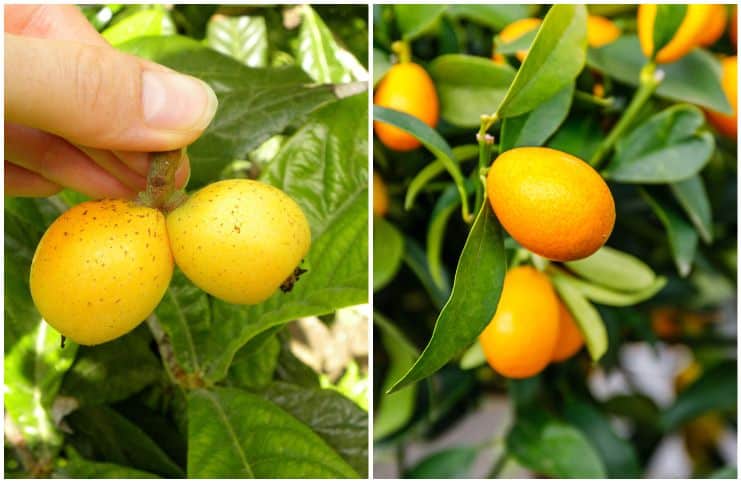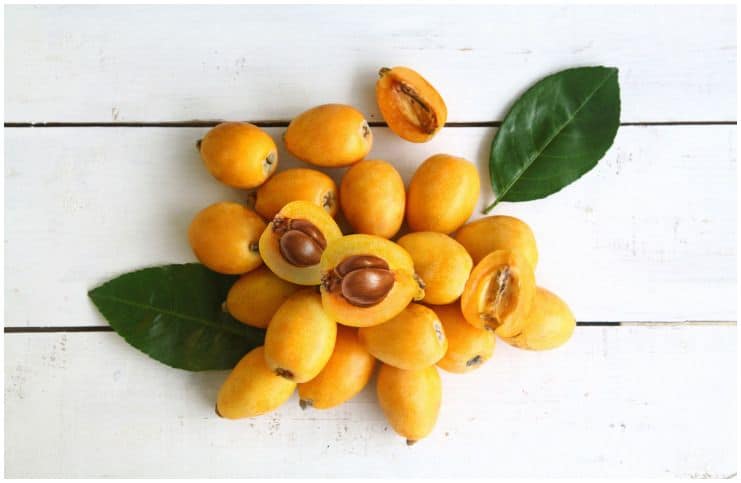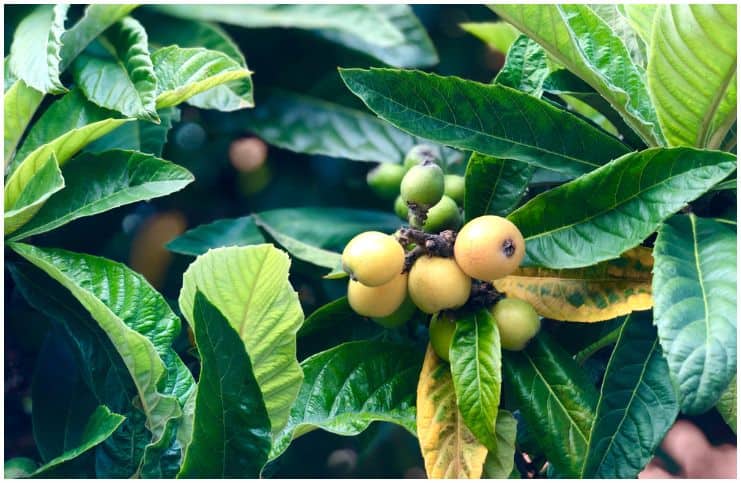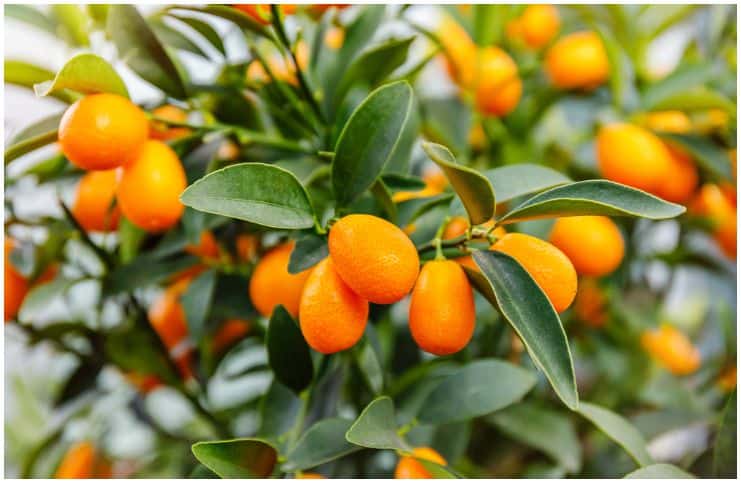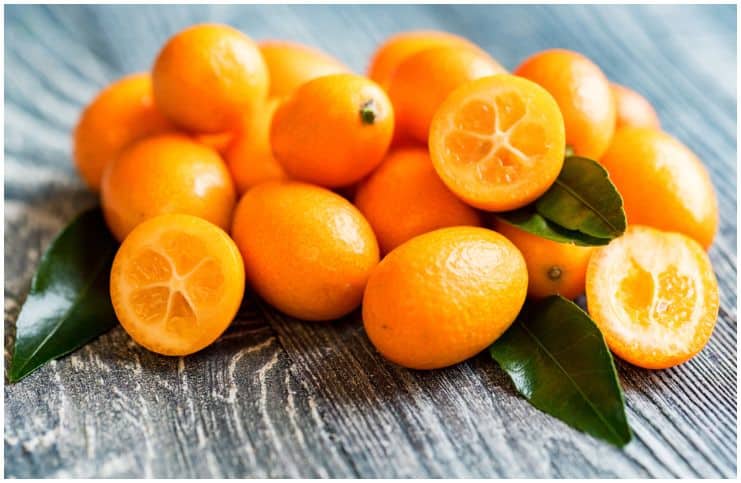Loquat vs Kumquat – Differences In Taste & Health Benefits:
Loquat
Loquat, also referred to as Chinese Plum, is a fruit native to China that grows on a large shrub, only in cooler areas – specifically hills.
In the present day, Japan is the leading producer of fruit, followed by Brazil and Israel.
The pulp has brown seeds of various sizes and is white in color.
Nutrition Facts
100g of loquat contains:
- 47 calories;
- 1.7g Fiber – 7% daily value;
- 0.4g Protein – 1% DV;
- 1528 IU Vitamin A – 31% DV;
- 1mg Vitamin C – 2% DV;
- 0.0mg Thiamin – 1% DV;
- 0.0mg Riboflavin – 1% DV;
- 0.2mg Niacin – 1% DV;
- 0.1mg Vitamin B6 – 5% DV;
- 14mcg Folate – 3% DV;
- 16mg Calcium – 2% DV;
- 0.3mg Iron – 2% DV;
- 13mg Magnesium – 3% DV;
- 27mg Phosphorus – 3% DV;
- 266mg Potassium – 8% DV;
- 0.0mg Copper – 2% DV;
- 0.1mg Manganese – 7% DV;
- 0.6mcg Selenium – 1% DV.
Health Benefits
Vitamin A
The vitamin A in this fruit is in the form of carotenoids, which must be converted by the body into usable vitamin A.
This vitamin helps in the development of the central nervous system and has a direct role in performing physiological functions.
It also has powerful antioxidant properties. Antioxidants are compounds that protect your cells against the negative effects of free radicals — any atom with at least one unpaired electron in the outermost shell that is produced when the body is exposed to radiation and tobacco smoke and during the breakdown of food.
100 grams of loquat has 1528 IU of vitamin A which is about 31% of the daily recommended intake.
Potassium
Potassium is an essential mineral for building muscles, preventing strokes, maintaining body growth, breaking down carbs, and maintaining fluid balance in the human body.
Due to the increased flow of blood to the capillaries of the brain, which can enhance cognition, potassium is also considered a brain booster. Moreover, this mineral can protect your heart from health issues by allowing it to pump blood without hindrance.
100 grams of loquat has 266mg of potassium which is about 8 percent of the daily recommended intake.
Vitamin B6
Vitamin B6, also referred to as pyridoxine, is one of the vitamins included in the vitamin B family.
Pyridoxine helps the body produce melatonin, which is vital in helping regulate your sleep and your internal clock. This vitamin also helps the body make the hormones norepinephrine and serotonin. In addition, pyridoxine is required for proper brain development and function.
100 grams of loquat has 0.1mg vitamin B6 that is approximately 5 percent of the daily recommended intake.
Kumquat
This fruit grows in a small tree belonging to the Rutaceae family, with a botanical name Citrus japonica. Kumquat has been called “the little gold gems of the citrus family.” It has a size just a little over an inch long, an oval shape, and the same color as an orange.
This fruit is native to China. It was introduced to Europe and North America by Scottish botanist Robert Fortune in 1846. Interestingly, zest and skin can be eaten and are sweet.
The fruit is excellent when used for lots of citrus dishes, marmalade, and even cocktails and liqueurs.
Tip – when selecting kumquat, look for firm, plump, brightly colored fruit without shriveled skin or blemishes.
Nutrition Facts
100g of kumquat contains:
- 71 calories;
- 6.5g Fiber –26% daily value;
- 1.9g Protein – 4% DV;
- 290 IU Vitamin A – 6% DV;
- 44mg Vitamin C – 73% DV;
- 0.2 mg Vitamin E – 1% DV;
- 0.0mg Thiamin – 2% DV;
- 0.1mg Riboflavin – 5% DV;
- 0.4mg Niacin – 2% DV;
- 0.0mg Vitamin B6 – 2% DV;
- 17mcg Folate – 4% DV;
- 0.2mg Pantothenic Acid – 2% DV;
- 62mg Calcium – 6% DV;
- 0.9mg Iron – 5% DV;
- 20mg Magnesium – 5% DV;
- 19mg Phosphorus – 2% DV;
- 186mg Potassium – 5% DV;
- 0.1mg Copper – 5% DV;
- 0.1mg Manganese – 7% DV.
Note – the kumquat peel too, is highly nutritious and possesses compounds such as:
- caryophylleneare;
- a-bergamotene;
- pinene;
- limonene.
Health Benefits
Dietary Fiber
Fiber can help to optimize glucose and insulin balance in the body, hence preventing people from developing type 2 diabetes. Fiber also helps add bulk to the stool to prevent problems like constipation and to keep you regular.
Moreover, if you suffer from bloating, cramping, or other stomach problems, dietary fiber can improve the health of your gut by easing inflammation levels and improving your gut bacteria.
100 grams of loquat has 6.5 grams of dietary fiber which is approximately 26 percent of the daily recommended intake.
READ MORE: Ashwagandha vs Ginseng
Vitamin C
Vitamin C has potent cancer-fighting properties, plus, its important role in collagen (the most abundant protein in the body) production help keep the skin healthy and repair tissues throughout the body. Also, vitamin C may help lower blood pressure in people with high blood pressure, according to a 2015 study published in ”Nature.”
A recent study which was done in Switzerland established that getting sufficient vitamin C could help improve the outcomes for diseases like malaria, diarrhea, and pneumonia.
100 grams of loquat has 44mg of vitamin C, which is approximately 73% of the daily recommended intake.
READ MORE: Lima Beans vs Edamame
Magnesium
Magnesium is an important mineral needed by the human body for maintaining overall health. Over fifty percent of your magnesium is stored in your bones, and it works in synergy with vitamin D and calcium to keep your bone structure solid.
This essential mineral also helps to treat severe backaches by relaxing kidney stress, back muscles, and muscular tension. Furthermore, it helps with nerve conduction and protein synthesis and is important in energy production in the body’s cells through the creation of adenosine triphosphate.
Symptoms of magnesium deficiency include:
- an abnormal heart rhythm;
- personality changes;
- loss of appetite;
- seizures;
- fatigue;
- muscle cramps;
- vomiting;
- numbness;
- weakness;
- nausea.
100 grams of loquat has 20mg of magnesium, which is about 5 percent of the daily recommended intake.
READ MORE: Breadfruit vs Jackfruit
Loquat vs Kumquat – Taste
Kumquats are tangy and sweet and acidic, a little bit like a sharp orange, however, the skin is surprisingly sweet – so they balance.
Tip – to make the fruit taste better, prior to eating a kumquat, try gently squeezing or rolling the fruit.
Loquat is sweet, juicy, and bursting with flavor. It has a similar texture to a pear, but with an added flavor, like apricot or mango.
READ THIS NEXT: Ginkgo Biloba vs Ginseng
References https://www.ncbi.nlm.nih.gov/pmc/articles/PMC5187783/ https://www.tandfonline.com/doi/full/10.1080/09168451.2015.1025033 https://www.ncbi.nlm.nih.gov/pmc/articles/PMC5143716/
